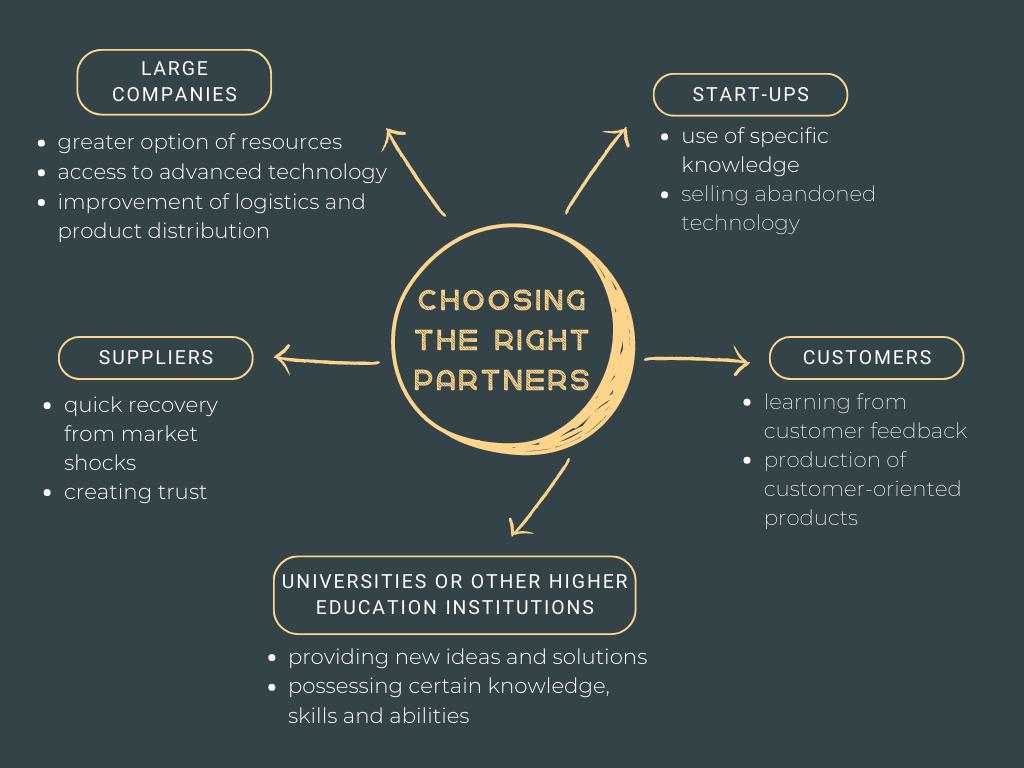|
|
Module 3: Knowledge management in-house and across organisations. |
|
|
Prof. Marina Dabić, Tena Obradović Posinković |
|
|
For the successful implementation of open innovation activities, it is not enough for SMEs to cooperate with external partners and exchange their ideas, technology, and knowledge. Small and medium-sized enterprises also need to develop capabilities, enable their employees to acquire knowledge and manage existing and newly acquired knowledge. Knowledge management helps managers control knowledge within their organizations, but also knowledge available outside their companies. In this module SMEs from bioeconomy and agri-food industry can learn about the types of knowledge, but also get advice for managing in-house knowledge, as well as knowledge across organizations. |
|
Upon completing this module, you should be able to: |
|
Selection of the right partners
SMEs from the bioeconomy and agri-food industry can benefit from buying external knowledge through inbound OI activities and from selling knowledge through outbound OI activities[4].
For the successful knowledge management in-house and across organizations, it is especially important for SMEs to select appropriate partners for collaboration. Studies show that companies that cooperate more deeply and widely with external partners benefit from the implementation of OI activities[5]. Furthermore, SMEs should integrate new external knowledge into existing knowledge management practices in order to achieve positive innovation results[6].
Therefore, SMEs in bioeconomy and agri-food industry are encouraged to collaborate with larger companies, start-ups, with customers, suppliers, competitors, and universities. The type of partner as well as the strategy of collaboration depends on each SMEs business model. SMEs can benefit from collaboration with:
- Large companies
Small and medium-sized companies can profit from cooperation with large companies. From the perspective of an SME, it can benefit from the resources that a large company has. Moreover, SMEs can benefit from cooperation by accessing the advanced technology needed for product success and can encourage other cooperation with larger enterprises. Additionally, this type of collaboration can improve the logistics and distribution of products. What is more, SMEs can benefit from licensing out their intellectual property, by selling their licenses to larger enterprises.
- Start-ups
Small and medium-sized enterprises can benefit from collaboration with start-ups by using specific knowledge that exists only in the start-up. Furthermore, SMEs can profit by selling the technology they have abandoned. Also, they can profit from a learning experience that can drive the development of other products. Additionally, SMEs can license the intellectual property of other companies and use it for further innovation.
- Suppliers
Collaboration with suppliers is highlighted as extremely important in the digital age, in times of globalization, but also market shocks such as pandemics, wars, natural disasters. During the COVID-19 pandemic, companies that have already adopted their business model according to an open strategy profited the most. SMEs can benefit from opening up their boundaries if they want to recover fast from the market shocks. Additionally, involving suppliers in the new product development process can have a positive financial and non-financial impact on SMEs.
- Customers
SME can benefit and learn from customers’ feedback. In today’s fast changing market and in times of digital transformation, customers are becoming more and more demanding. Information is more available than ever, and if companies want to succeed, they must produce customer-oriented products. SMEs can communicate with their customers and receive feedback over social media, web or in person. Today’s customers don’t just want a perfect product, they want an experience as well.
- Universities or other higher education institutions
Universities or other higher education institutions can help SMEs launch new products or provide new ideas and solutions. For example, a higher education institution has certain knowledge, skills or abilities that can help a small and medium-sized enterprise. Universities are full of talent and can facilitate further economic growth. From the university’s perspective, collaboration with SMEs can provide a real case study and can gather data for their further research.
 Figure 2: Choosing the right partner[7]
Figure 2: Choosing the right partner[7]
For small and medium-sized companies in the bioeconomy and agri-food industry, it is important to choose the right partner and create an open culture full of trust. Partners may possess skills and resources (monetary or non-monetary) that can improve existing products or can provide solutions for new products. It is important that the strategic partner is compatible and corresponds to the business model of SMEs. In addition, it is important that partners share the same core values.
Take a 3-5 minutes and think:
3. How can your SME benefit from external sources of knowledge?
4. Explain your current partnerships. How many partners does your SME work with? How does your SME benefit from cooperation?
Think how could you explain these terms to another person and write it down.